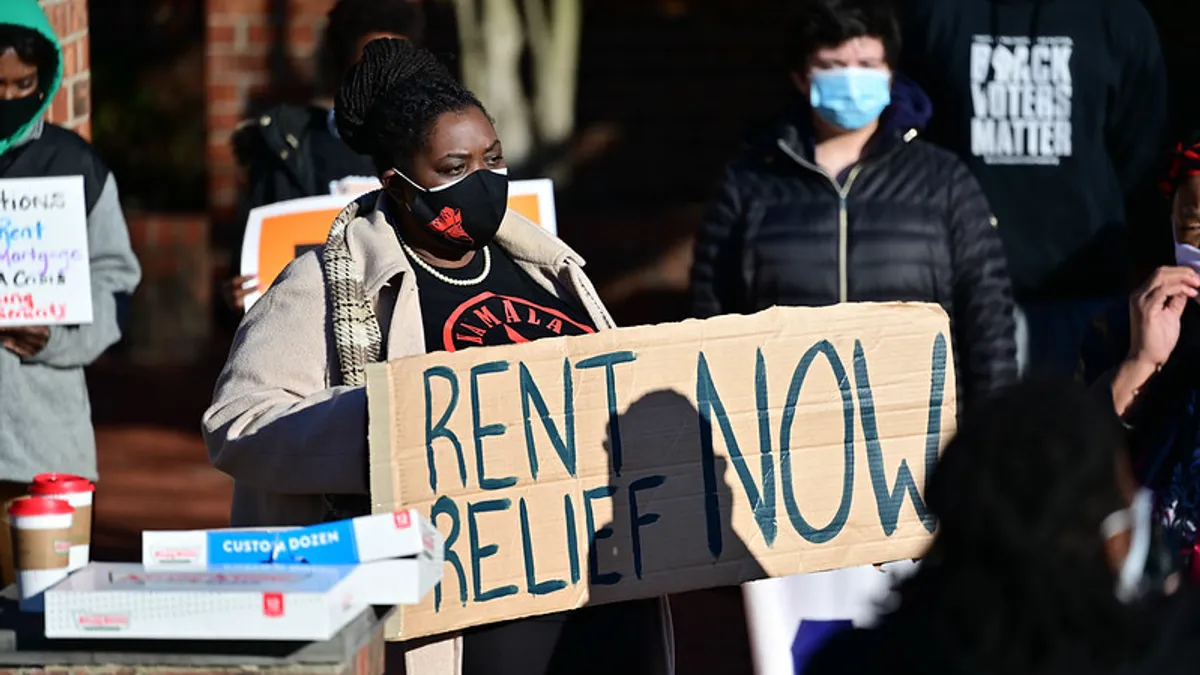UPDATE: March 29, 2021: The Centers for Disease Control and Prevention (CDC) has extended the national eviction moratorium through June 30, 2021.
The moratorium was set to expire March 31, having been extended by the Biden administration at the beginning of the year. That lapse could have triggered an "unprecedented wave of evictions" that would have threatened to increase coronavirus infection rates, CDC Director Rochelle Walensky wrote in a statement.
The National Low Income Housing Coalition and over 2,000 industry groups, however, have urged the CDC to strengthen the moratorium in part by issuing an automatic and universal moratorium.
Dive Brief:
- Federal, state and local-level eviction moratoriums have helped reduce eviction filings amid the pandemic, according to a report this week from the U.S. Government Accountability Office (GAO). However, some eligible renters may not have benefited from the recent federal intervention in part due to a lack of clear communication, per the report.
- The median rate of eviction filings was 74% lower in the final week of July 2020 — when a CARES Act moratorium expired — compared to the same week in 2019, according to a GAO analysis of 63 jurisdictions. But eviction filings began to increase during a separate Centers for Disease Control and Prevention (CDC) moratorium in September 2020 in jurisdictions without separate state or local moratoriums, suggesting that some renters "may not fully understand how to use the CDC moratorium," GAO wrote.
- The GAO has recommended that the CDC implement an outreach strategy to help renters and property owners become aware of the agency’s eviction moratorium extended through March 31, as the agency has "taken few steps to promote awareness and understanding of the moratorium and its requirements," the report states.
Dive Insight:
The Biden team set the tone for its housing agenda during the administration's first days in office, extending the federal eviction moratorium through March 31. The administration also proceeded to include $25 billion in emergency rental assistance, in addition to $5 billion in vouchers for individuals experiencing homelessness, in the $1.9 trillion American Rescue Plan.
Other recent federal housing efforts have included an executive order to advance racial equity, in part by helping to close racial housing gaps; an order for the U.S. Department of Housing and Urban Development (HUD) to examine Trump-era housing rule effects on fair housing; and the appointment of HUD Secretary Marcia Fudge.
But despite those efforts and the extension of the federal moratorium, eviction filings are still happening and people are still accruing back-rent.
About 18% of U.S. renters had become steeped in back-rent as of January 2021, with the average of those renters owing $5,600, CNBC reported. And communities of color have been disproportionately impacted, with Black and Latinx people representing 80% of the people who faced eviction in August.
The timely distribution of the $25 billion in emergency rental relief is going to be critically important, particularly if the federal eviction moratorium is not extended, according to John Pendleton, a director at GAO.
"The next key moment is the eviction moratorium expiring at the end of this month," he said. "And I'm not sure that it's reasonable to expect that the monies that are in the pipeline are going to be distributed by the time the moratorium ends and so there's some worry that there'll be a cliff effect of evictions starting on April 1."
The federal eviction moratorium has also been dealt some recent blows. Federal judges in Texas and Ohio recently ruled that "the government overstepped its authority" by implementing the moratorium, CNBC reported.
The ruling in Texas "could put millions of struggling renters at risk of losing their homes during the pandemic," President and CEO of the National Low Income Housing Coalition Diane Yentel said in a statement."Without federal intervention to uphold the eviction moratorium until rental assistance is distributed, tens of millions of people could lose their homes."












